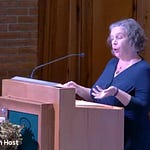As someone who has tried on many different “hats” over my life, in my mid-20s I tried on the “hat” of business professional. I ended up at the University of Michigan Business School, sitting through classes in accounting, finance, and marketing. I was a diligent student, but my heart wasn’t in it. Most of what I learned has faded, but one lesson stuck with me: sunk costs are irrelevant for future decision-making.
What’s already spent – money, time, reputation – can’t be recovered. The only question that matters is: what’s the best choice going forward?
That may sound like economics, but it’s really about freedom. I have applied this concept to many different areas of my life. Once we name something as a sunk cost, it no longer controls us. We’re free to choose again. And that freedom opens us to love – to love ourselves with grace, to love others with compassion, and maybe even to love this country enough to choose integrity over fear.
Our individual decisions matter, because our collective choices, whether political, social, or cultural, shape the future we’ll hand to the next generation. Love calls us to face our current circumstances clearly, and to courageously choose a better way forward together.
Sunk cost isn’t just business theory. We’ve all felt it. Think about a car you’ve poured money into – another $2,000 repair looming just months after the last one. Do you keep paying because you’ve already invested so much, or do you step back and ask what choice makes sense for the future? That moment – that pause – is where the sunk cost principle becomes real.
And when we don’t let go, when we keep investing just because of what we’ve already given, it’s like hitching our wagon to a sinking ship. I know it’s a mixed metaphor – you don’t normally hitch a wagon to a ship – but that’s the point. We pile in everything we care about – our time, our trust, our relationships – and tether it to something we believe will carry us where we want to go. At first it looks strong, even unstoppable. But when it starts to sink, we still stay hitched. Not because it’s working, but because we’ve already given so much to it.
Remember the Titanic? The marketing promised it was unsinkable. Even after it struck the iceberg, the ship seemed steady. Passengers walked the decks, reassured by its size and reputation. Certainty can be that blinding. Fear whispers, stay put, don’t admit you’re in danger. And so we cling to the idea we’re safe, even as the water rises beneath our feet.
But naming sunk costs frees us. Grace for our past choices releases shame. Courage for our next choices opens the future. And that freedom is also the freedom to love:
Love for ourselves: releasing shame, trusting we’re allowed to begin again.
Love for others: unhitching from harmful allegiances or rigid certainties so we can act with compassion.
Love for our nation and community: choosing integrity over fear, even when it costs us pride.
Here’s the hard part: the more we’ve invested – money, reputation, emotional energy – the harder it is to walk away. Psychologists call this escalation of commitment. In the 1950s, Leon Festinger studied doomsday groups after prophecies failed. Instead of walking away, many followers doubled down. They gave more time, more money, more loyalty. Add in loss aversion – our tendency to feel losses more intensely than gains – and you’ve got a powerful glue that keeps us stuck.
We’ve seen it again and again. In 1999, people braced for Y2K, stocking up on food and supplies, fearing computers would crash and society would collapse at midnight. In 2011, Harold Camping predicted the Rapture so precisely that some of his followers sold homes, gave away savings, and left jobs behind. In 2012, speculation around the Mayan calendar fueled a wave of end-of-the-world theories, with people preparing for doomsday in earnest. Different details, same human ache: when life feels uncertain, certainty feels like safety. Even when the date passes and nothing happens, it can feel easier to defend the story than to admit we were wrong.
And underneath the economics is something tender: meaning. When we’ve tied our identity, our community, and our hope to a story, admitting it isn’t true can feel like losing our place in the world. So we reach for certainty to soothe our fear. That doesn’t make us gullible; it makes us human. But naming the pattern gives us a choice: we can keep feeding the fear… or we can unhitch with grace and let truth, not certainty, lead us forward.
This same dynamic plays out in our political lives. We hitch our wagons to leaders or movements that promise clarity in confusing times. They offer strength when we feel afraid, simple answers when the problems are complex. And fear makes those promises magnetic. But certainty is often an illusion. Cracks begin to show, promises fall apart. And still we stay on board, because so much of our identity, trust, and community is tied to that ship.
But refusing to act when we know better only drags us down with the wreckage. Grace for our past selves doesn’t mean staying stuck; it means using what we’ve learned to choose differently. The real waste isn’t admitting we were wrong. The real waste is refusing to act now that we know better.
And that’s where we stand as a people right now. Some of us may be realizing that the story we hitched ourselves to – politically, religiously, socially – isn’t taking us where we thought it would. The promises of safety, prosperity, or moral certainty aren’t holding up. The ship is taking on water. That’s a terrifying realization. Because if we unhitch, what then? What will people think? What will it cost us?
And yet, if we keep holding on, we’re sacrificing the future.
Fear makes us cling. It convinces us the ship we’re tied to will keep us safe, even as the cracks spread beneath the surface. Fear makes us believe that letting go is more dangerous than going down with the wreckage. And fear feeds on certainty, even false certainty, because certainty feels easier than change.
Like the Titanic after she hit the iceberg. The ship was still upright, the lights still glowed, the music still played. Many on board believed the hype – that it was unsinkable – so they stayed, even as the water rose. It’s the same illusion fear offers us: if we just hold tighter, maybe the story will carry us where we wanted to go.
But we are not meant to live shackled to fear. We are meant to choose, again and again, the course that leads toward life. Grace frees us from shame. Courage frees us for the future. And love calls us to unhitch from a sinking ship, to notice the cracks before it’s too late, and to chart a truer path – one built not on fear and false certainty, but on integrity, compassion, and love.
Joni Miller, Ph.D., is a writer, researcher, spiritual coach, and speaker who uses her knowledge, education, and love of all things spiritual to help spiritual wanderers find a place they can call home, navigating by the light of Love. www.SpiritualGeography.net
Photo by Randall Edholm: https://www.pexels.com/photo/photo-of-a-sinking-ship-12097508/











